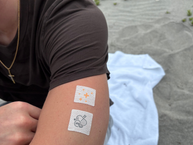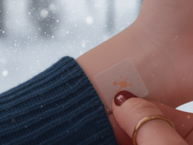America is the land of plenty and, unfortunately, the land of overeating. However, Americans may not be over-eating the most nutrient-dense foods. It turns out that 92% of Americans have at least one vitamin or mineral deficiency, and many have multiple deficiencies.
You can get essential vitamins and minerals from the foods you eat, but not everyone gets enough of each nutrient each day to meet their needs. There are many reasons why people can be low in certain deficiencies. Using PatchAid Vitamin Patches may be a good strategy for you to boost your nutrient levels, as long as your doctor agrees.*
Vitamin D
It may seem funny to think of being deficient in a vitamin that your own body can make, but vitamin D deficiency is rampant in the US. Close to half of American adults are deficient, including 90% of black Amerians.
Vitamin D helps your body absorb and use calcium properly, including for strengthening bone mineral. It is also necessary for a strong immune system. Deficiency of vitamin D can cause rickets, osteomalacia, or weaker bones, and muscle pain and weakness.
These are some food sources of vitamin D.
- Vitamin D-fortified milk, orange juice, breakfast cereals, and yogurt.
- Fatty fish.
- Egg yolks.
As you can see, there are not many sources. It is easy to consume a diet low in vitamin D, even if it is high in generally healthy foods, such as fruits, vegetables, whole grains, and healthy fats.
Vitamin D is known as the sunshine vitamin because your skin can make it when you are exposed to radiation from the sun. However, not everyone makes enough. These people are at risk for deficiency.
- People on a plant-based or dairy-free diet.
- People with dark skin or older adults.
- People who cover their skin or use sunscreen when they go outside.
- People who live in northern climates.
It is easy to test your vitamin D levels. Ask your healthcare provider to order labs, and you can get it done with a regular blood draw. You do not even need to be fasting to get an accurate reading.
If you are low in vitamin D, your provider might agree that a Vitamin D3 Patch by PatchAid can be a good idea. They come with calcium, magnesium, and vitamin K, too, and may help support bone, heart, immune, and muscular health.*
Vitamin C
This is another vitamin that you may consider being at risk for deficiency. After all, you are unlikely to have scurvy, which is the deficiency disease caused by severe vitamin C deficiency. Signs of scurvy can include loss of teeth, bleeding gums, easily bruised skin, and poor wound healing. Scurvy can even cause death. In contrast, a less severe vitamin C deficiency can lead to milder signs.
Scurvy is the condition that made people first realize that a substance, later found to be vitamin C, was essential in the diet. British sailors had scurvy on long voyages, but were able to prevent it or make it milder by sucking on limes to get the juice. Only later was it determined that vitamin C deficiency was the cause of scurvy, and limes and other citrus fruits, not to mention many other fresh fruits and vegetables, were sources of vitamin C.
Milder signs of vitamin C deficiency can include these.
- Fatigue due to interference with normal fat metabolism.
- Fatigue and easy infections due to lower iron levels from reduced iron absorption.
- Increased infections.
With vitamin C, it is not just about preventing deficiencies. Vitamin C is needed for optimal heart health, and it is also an antioxidant.
You can get vitamin C from these foods.
- Fresh fruit such as strawberries, kiwi, melon, blueberries, oranges, grapefruit.
- Fresh vegetables such as tomatoes, onions, bell peppers, potatoes, spinach, and cauliflower.
The Vitamin C Plus Patch by PatchAid may help maintain normal tissue concentrations of vitamin C.* Along with vitamin C, it has citrus bioflavonoids, which are antioxidants, as well as rutin, which is found in buckwheat, raspberries, and asparagus.
Magnesium
Magnesium is an essential mineral for muscle and nerve function, as well as for strong bones.* You also need it for a normal mood, to be able to relax properly, and for optimal heart health.* It is in foods such as lima beans, chocolate, milk, bananas, nuts, brown rice, and wheat germ.
A variety of PatchAid patches have magnesium. Examples include the Focus and Clarity Patch, Sleep Aid Patch, Migraine Relief Patch, and Relax and Unwind Patch. You can also get magnesium from the Vitamin D3/Calcium Patch.
Other Nutrients
There are many other vitamins and minerals that are sometimes or often low, especially in certain populations. Examples include older adults, people with malabsorption and people on restricted diets, such as bariatric surgery patients and people who avoid gluten, dairy, or animal-source foods.
A balanced diet is the first line of defense against vitamin deficiencies. In general, a varied diet with a lot of wholesome, unprocessed foods is best. These are the types of foods that can provide large amounts of nutrients.
- Whole grains and fortified refined grains
- Fruits and vegetables
- Olive oil
- Nuts and seeds
- Fatty fish
- Eggs
- Dairy products
Still, if you suspect a nutrient deficiency, it is best to take action. Talk to your healthcare provider about your concerns, and consider getting evaluated. You may test levels of certain nutrients, and also get assessed for risk of deficiency based on dietary intake.
If you are at risk, or your doctor agrees it is a good idea, a multivitamin and mineral supplement may help provide peace of mind. The PatchAid Multivitamin Plus Patch has over 20 essential vitamins and minerals.
You can use PatchAid Patches without worrying about gastrointestinal side effects, since nutrients are absorbed transdermally, or across the skin. Just put them on for 8 hours, and use another one the next day. It is okay to use multiple PatchAid Vitamin Patches at once, as long as your healthcare provider agrees.
*The Food and Drug Administration has not evaluated these statements. PatchAid patches are not intended to diagnose, treat, cure or prevent any disease. Anyone with a medical condition should seek the advice of a licensed medical practitioner. Individual results may vary.







